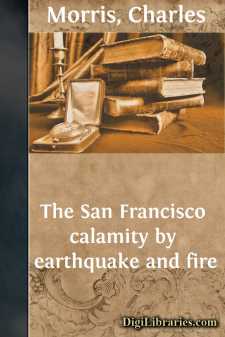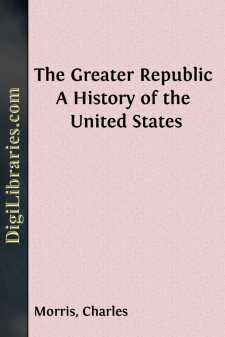Categories
- Antiques & Collectibles 13
- Architecture 36
- Art 48
- Bibles 22
- Biography & Autobiography 815
- Body, Mind & Spirit 144
- Business & Economics 28
- Children's Books 18
- Children's Fiction 14
- Computers 4
- Cooking 94
- Crafts & Hobbies 4
- Drama 346
- Education 58
- Family & Relationships 59
- Fiction 11833
- Games 19
- Gardening 17
- Health & Fitness 34
- History 1378
- House & Home 1
- Humor 147
- Juvenile Fiction 1873
- Juvenile Nonfiction 202
- Language Arts & Disciplines 89
- Law 16
- Literary Collections 686
- Literary Criticism 179
- Mathematics 13
- Medical 41
- Music 40
- Nature 179
- Non-Classifiable 1768
- Performing Arts 7
- Periodicals 1453
- Philosophy 65
- Photography 2
- Poetry 896
- Political Science 203
- Psychology 44
- Reference 154
- Religion 515
- Science 126
- Self-Help 85
- Social Science 82
- Sports & Recreation 34
- Study Aids 3
- Technology & Engineering 59
- Transportation 23
- Travel 463
- True Crime 29
Charles Morris
Charles William Morris (1901-1979) was an influential American philosopher, semiotician, and pragmatist. He made significant contributions to semiotics, the study of signs and symbols, emphasizing their role in communication and meaning-making. Morris also developed a pragmatic philosophy that integrated ideas from logic, linguistics, and psychology, influencing fields such as communication theory and cognitive science.
Author's Books:
Sort by:
by:
Charles Morris
CHAPTER I. San Francisco and Its Terrific Earthquake. On the splendid Bay of San Francisco, one of the noblest harbors on the whole vast range of the Pacific Ocean, long has stood, like a Queen of the West on its seven hills, the beautiful city of San Francisco, the youngest and in its own way one of the most beautiful and attractive of the large cities of the United States. Born less than sixty years...
more...
by:
Charles Morris
EVOLUTION VERSUS CREATION In any consideration of the origin of man we are necessarily restricted to two views: one, that he is the outcome of a development from the lower animals; the other, that he came into existence through direct creation. No third mode of origin can be conceived, and we may safely confine ourselves to a review of these two claims. They are the opposites of each other in every...
more...
by:
Charles Morris
HERMANN, THE HERO OF GERMANY. In the days of Augustus, the emperor of Rome in its golden age of prosperity, an earnest effort was made to subdue and civilize barbarian Germany. Drusus, the step-son of the emperor, led the first army of invasion into this forest-clad land of the north, penetrating deeply into the country and building numerous forts to guard his conquests. His last invasion took him as...
more...
by:
Charles Morris
INTRODUCTORY. Geoffrey of Monmouth, the famous chronicler of legendary British history, tells us,—in reference to the time when the Celtic kings of Britain were struggling against the Saxon invaders,—that "there appeared a star of wonderful magnitude and brightness, darting its rays, at the end of which was a globe of fire in the form of a dragon, out of whose mouth issued two rays; one of...
more...
by:
Charles Morris
THE HUNS AT ORLEANS. On the edge of a grand plain, almost in the centre of France, rises a rich and beautiful city, time-honored and famous, for it stood there before France had begun and while Rome still spread its wide wings over this whole region, and it has been the scene of some of the most notable events in French history. The Gauls, one of whose cities it was, named it Genabum. The Romans...
more...
by:
Charles Morris
The late war with Spain marks a momentous epoch in the progress of our country, whose history, stretching through the centuries of discovery, exploration, settlement, the struggle for independence, foreign and domestic war, lofty achievement in all departments of knowledge and progress, is the most interesting in human annals. It is a record full of instruction and incitement to endeavor, which must...
more...
by:
Charles Morris
Far over the eastern half of Europe extends a vast and mighty plain, spreading thousands of miles to the north and south, to the east and west, in the north a land of forests, in the south and east a region of treeless levels. Here stretches the Black Land, whose deep dark soil is fit for endless harvests; here are the arable steppes, a vast fertile prairie land, and here again the barren steppes, fit...
more...
by:
Charles Morris
THE FIRST OF THE MIKADOS. The year 1 in Japan is the same date as 660 B.C. of the Christian era, so that Japan is now in its twenty-sixth century. Then everything began. Before that date all is mystery and mythology. After that date there is something resembling history, though in the early times it is an odd mixture of history and fable. As for the gods of ancient Japan, they were many in number, and...
more...
by:
Charles Morris
HOW ROME WAS FOUNDED. Very far back in time, more than twenty-six hundred years ago, on the banks of a small Italian river, known as the Tiber, were laid the foundations of a city which was in time to become the conqueror of the civilized world. Of the early days of this renowned city of Rome we know very little. What is called its history is really only legend,—stories invented by poets, or ancient...
more...
by:
Charles Morris
HOW ENGLAND BECAME CHRISTIAN. One day, in the far-off sixth century, a youthful deacon of the Roman Church walked into the slave-market of Rome, situated at one extremity of the ancient Forum. Gregory, his name; his origin from an ancient noble family, whose genealogy could be traced back to the days of the early Cæsars. A youth was this of imperial powers of mind, one who, had he lived when Rome was...
more...











